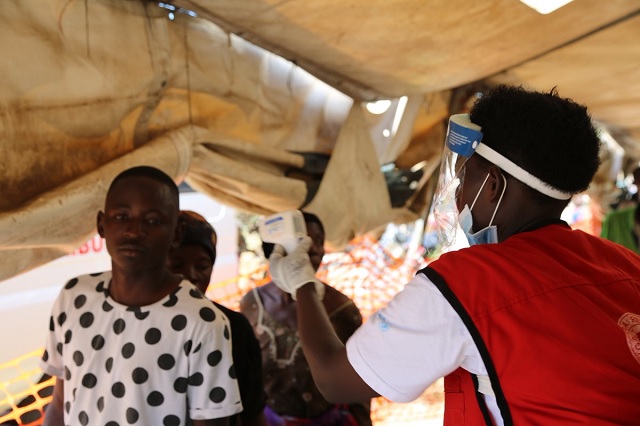
Kampala, Uganda | THE INDEPENDENT | Uganda still has a big challenge to fund Ebola prevention efforts amid an influx of people from the Democratic Republic of Congo. This is according to Dr Allan Muruta, the Commissioner Epidemiology and Surveillance at the Ministry of Health.
Dr Muruta observes that more than 1,000 people cross the border into Uganda every of the two market days from the Democratic Republic of Congo, where Ebola has killed more than 1400 people in a space of 10 months. Thousands of others enter the country every day, escaping insecurity in Eastern Congo.
Uganda confirmed an outbreak of Ebola on June 11, and three people have since died. Dr Muruta says that as part of the prevention drive, they have vaccinated all the 107 contacts that are suspected to have been in contact with the confirmed Ebola cases.
Since then, he said 1,063 health workers and contacts in high-risk districts have been vaccinated adding to the 4700 – including the mother of the two that succumbed had been vaccinated before the outbreak.
He explains that half of the USD 7 million funding for the response goes into the procurement of supplies such as gloves whose consumption is very high considering the fact that they are used once and discarded.
Henry Magala the Country Programme Director of Civil Society Organisation – Uganda Cares observes that although Uganda is containing the outbreak, not much has been done by the Democratic Republic of Congo (DRC) to control Ebola, putting Uganda at a higher risk.
According to him, even as constant surveillance and screening are being done at the borders to keep infection at bay, health workers lack enough supplies for screening especially gloves and thermometers.
Magala was this morning handing over a donation of 37 items including thermos scanners, gloves, gumboots, mattresses, chlorine powder, biohazard bags, bins, hand washing facilities, cannulas, syringes and IV fluids, among others, to support prevention efforts by facilities in Kasese, Kampala, Mbarara and Masaka districts. The donated items were worth 111 million Shillings.
Loy Muhindo, the Assistant District Health Officer Kasese tells URN that such statistics mean that they who are at the border cannot stop surveillance and screening as and yet they had gone short of supplies.
*****
URN
 The Independent Uganda: You get the Truth we Pay the Price
The Independent Uganda: You get the Truth we Pay the Price





